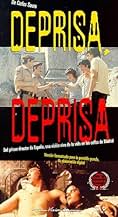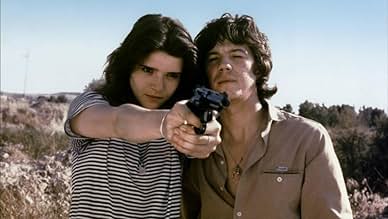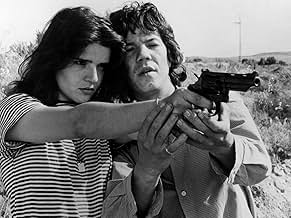IMDb-BEWERTUNG
7,0/10
1962
IHRE BEWERTUNG
Füge eine Handlung in deiner Sprache hinzuAngela begins to hang around with Pablo and his gang of young robbers.Angela begins to hang around with Pablo and his gang of young robbers.Angela begins to hang around with Pablo and his gang of young robbers.
- Regie
- Drehbuch
- Hauptbesetzung
- Auszeichnungen
- 1 Gewinn & 1 Nominierung insgesamt
Berta Socuéllamos
- Ángela
- (as Berta Socuellamos)
Jose Antonio Valdelomar González
- Pablo
- (as Jose Antonio Valdelomar)
Jesús Arias
- Meca
- (as Jesus Arias)
José María Hervás Roldán
- Sebas
- (as Jose Mª Hervas)
María del Mar Serrano
- María
- (as Maria del Mar Serrano)
André Falcon
- Cajero
- (as Andre Falcon)
Yves Barsacq
- Luis
- (as Ives Barsacq)
Joaquín Escola
- Doctor
- (as Joaquin Escola)
Matías Prats
- Locutor
- (as Matias Prats)
Empfohlene Bewertungen
This film made such a deep impression upon me that I was sure to view it a second time before it disappeared from tcm "on demand" for an indefinite period of time. Who knows for how long? I may even watch it a third time before its one week run expires at midnight tonight.
In some ways, this film reminds me of notable American films depicting crime sprees, such as "Badlands" or "Gun Crazy", but it is uniquely Spanish in nature and truly stands on its own as a distinctive work of art. Carlos Saura, a director with whom I was totally unfamiliar before a recent tcm double feature of two of his films, is to be commended for an outstanding film that captures a very special atmosphere and tone.
I travelled in Spain, including Madrid, for a month at the end of 1971 when Francisco Franco still ruled the country with a strong arm, including an intricate network of secret police that was not unlike totalitarian regimes everywhere else throughout history. It is very significant that this film was produced after the death of Franco because the Spain that is depicted in this movie seems like a very different country than the Spain that I visited in 1971. While the police in the film are tough enough, they were most likely a much more formidable force during Franco's iron rule.
The use by Saura of the speeding trains outside the balcony of the flat used by the gang as its headquarters is brilliant as they symbolize a society that doesn't even pause for a moment to consider the existence of this totally alienated group until it draws attention to itself by breaking the law, sometimes in extremely violent ways. I could have been riding on one of those trains as a foreign tourist, totally unaware of the existence of this element as it was kicked to the curb of Spanish civilization. Note the shocked, disgusted reaction of the two older, established women when they are suddenly confronted by the disrespect displayed by the delinquent group at the holy site.
The strong flamenco influence of the gypsy rumba music played in the background throughout the film also creates a uniquely delicious Spanish flavor to the film. The musical score powerfully contributes to the overall impact, which is no less than magical and hypnotic for me. The use of amateur actors is another stroke of genius by the director as it makes the action all the more real and believable, not unlike the post World War II Italian films of Vittorio De Sica which I also love.
Did anyone expect the "respectable" doctor to return, as he had promised, after he took Angela's money? And what was to become of Angela after she walked into the darkness at the end? I very much wanted to know. From the very start, the genius of Carlos Saura sustained my interest and involvement to the bitter end. This is a great and much under-rated movie!
In some ways, this film reminds me of notable American films depicting crime sprees, such as "Badlands" or "Gun Crazy", but it is uniquely Spanish in nature and truly stands on its own as a distinctive work of art. Carlos Saura, a director with whom I was totally unfamiliar before a recent tcm double feature of two of his films, is to be commended for an outstanding film that captures a very special atmosphere and tone.
I travelled in Spain, including Madrid, for a month at the end of 1971 when Francisco Franco still ruled the country with a strong arm, including an intricate network of secret police that was not unlike totalitarian regimes everywhere else throughout history. It is very significant that this film was produced after the death of Franco because the Spain that is depicted in this movie seems like a very different country than the Spain that I visited in 1971. While the police in the film are tough enough, they were most likely a much more formidable force during Franco's iron rule.
The use by Saura of the speeding trains outside the balcony of the flat used by the gang as its headquarters is brilliant as they symbolize a society that doesn't even pause for a moment to consider the existence of this totally alienated group until it draws attention to itself by breaking the law, sometimes in extremely violent ways. I could have been riding on one of those trains as a foreign tourist, totally unaware of the existence of this element as it was kicked to the curb of Spanish civilization. Note the shocked, disgusted reaction of the two older, established women when they are suddenly confronted by the disrespect displayed by the delinquent group at the holy site.
The strong flamenco influence of the gypsy rumba music played in the background throughout the film also creates a uniquely delicious Spanish flavor to the film. The musical score powerfully contributes to the overall impact, which is no less than magical and hypnotic for me. The use of amateur actors is another stroke of genius by the director as it makes the action all the more real and believable, not unlike the post World War II Italian films of Vittorio De Sica which I also love.
Did anyone expect the "respectable" doctor to return, as he had promised, after he took Angela's money? And what was to become of Angela after she walked into the darkness at the end? I very much wanted to know. From the very start, the genius of Carlos Saura sustained my interest and involvement to the bitter end. This is a great and much under-rated movie!
This movie makes beautiful use of Flamenco music, and does it better than any I've seen. Carlos Saura obviously cares deeply about the medium, as he also made a movie called Flamenco (although it's just a concert piece).
The story is very basic; it deals with the adventures of young street-criminals in Madrid who graduate from car-theft to bank-robbery. What's interesting is the way Saura makes us care about these "hijos de nadie", who are kind and decent people 50% of the time, and feel they have no future in regular society. But the movie never sentimentalizes them - they do exactly what you'd expect such people to do.
Dialogue is kept to a minimum; a lot of the communication is via the graceful gestures the Spanish are so good at. This allows extra time for the soundtrack, and it really gets you into the spirit of the film, which is really more like dance than acting.
Flamenco originated among the dispossessed, among beggars and gypsies condemned to live in waste places and junkyards on the edge of town, and the scenes of the barren housing-projects on the fringes of Madrid really bring this feeling to life.
Deprisa, Deprisa conveys a better understanding of the spirit of Flamenco than more elegant movies dedicated to the subject. (And Carlos Saura is a genius).
The story is very basic; it deals with the adventures of young street-criminals in Madrid who graduate from car-theft to bank-robbery. What's interesting is the way Saura makes us care about these "hijos de nadie", who are kind and decent people 50% of the time, and feel they have no future in regular society. But the movie never sentimentalizes them - they do exactly what you'd expect such people to do.
Dialogue is kept to a minimum; a lot of the communication is via the graceful gestures the Spanish are so good at. This allows extra time for the soundtrack, and it really gets you into the spirit of the film, which is really more like dance than acting.
Flamenco originated among the dispossessed, among beggars and gypsies condemned to live in waste places and junkyards on the edge of town, and the scenes of the barren housing-projects on the fringes of Madrid really bring this feeling to life.
Deprisa, Deprisa conveys a better understanding of the spirit of Flamenco than more elegant movies dedicated to the subject. (And Carlos Saura is a genius).
Jose Antonio Valdelomar Gonzales asks Berta Socuellamos to be his girlfriend. She agrees. She integrates quickly into his gang of bank robbers. For a while, things go very nicely. They make large scores, leave no important clues, and she is saving money to buy an apartment for them. Then a job goes wrong.
The most notable thing about this movie by Carlos Saura is that the six top roles -- the men in the gang, Srta Socuellamos, and another member's girl friend -- were found in casting calls for non-professional actors. Only one of them appeared on the screen again. Gonzales died 11 years later of a drug overdose in prison, where he was arrested for bank robbery. Rumors abound about the production, most of them scurrilous. I won't take Saura too much to task for this sort of casting; from Academician "theory of types" to Robert Bresson, to Eastwood in THE 15:17 TO PARIS, directors have undertaken to cast non-professional in key roles, sometimes under elaborate theories, sometimes because you admire what they did, and sometimes because, well, why hire some one to play Audie Murphy, when he's on the payroll as an actor?
Saura does get good performances out of them, by directing them to maintain low affects and keeping their lines simple. He crafts believable situations, tense bank robberies, and so forth. So it's a very well made movie. If anything, it demonstrates another Academician theory, the Kuelshov Effect, which is that acting is largely irrelevant to acting; the audience infers the thoughts of the actors by how the shots are edited together.
The most notable thing about this movie by Carlos Saura is that the six top roles -- the men in the gang, Srta Socuellamos, and another member's girl friend -- were found in casting calls for non-professional actors. Only one of them appeared on the screen again. Gonzales died 11 years later of a drug overdose in prison, where he was arrested for bank robbery. Rumors abound about the production, most of them scurrilous. I won't take Saura too much to task for this sort of casting; from Academician "theory of types" to Robert Bresson, to Eastwood in THE 15:17 TO PARIS, directors have undertaken to cast non-professional in key roles, sometimes under elaborate theories, sometimes because you admire what they did, and sometimes because, well, why hire some one to play Audie Murphy, when he's on the payroll as an actor?
Saura does get good performances out of them, by directing them to maintain low affects and keeping their lines simple. He crafts believable situations, tense bank robberies, and so forth. So it's a very well made movie. If anything, it demonstrates another Academician theory, the Kuelshov Effect, which is that acting is largely irrelevant to acting; the audience infers the thoughts of the actors by how the shots are edited together.
Those folks who enjoyed "Gun Crazy" or "Badlands" or those who, like me, wondered if this artsy fartsy director would or could ever tell a direct, hard hitting story without any pretentious BS, should be most satisfied with this bleak tale of juvies in Madrid set in the days when Francoism was yielding, ever so slowly, to Democracy.
It has been criticized for "glorifying" the four young sociopaths but I just don't see it. I mean, unless they are holding up banks or burning cars or killing people the quartet are half dead most of the time and, when they do speak, what they have to say tends toward the extremely banal and, though they are successful in their left handed endeavors for a while, three of the four meet decidedly unromantic, violent ends while the fourth is seen at film's end walking into darkness where I doubt if even youthful Spanish audiences in 1981 wished to follow her.
Perhaps it was Saura's jaundiced view of Spanish society, with its high corruption quotient and trigger happy, authoritarian cops a reminder that ol Francisco F wasn't that far in the rear view mirror, that caused film critics to think that he was making his destructive, chaotic teens heroes. But in this film there are no heroes, anti or otherwise. Consequently, this viewer felt very little pity for them as they met their depressing fates. Plenty of admiration for the four actors who portrayed them, though, especially when you consider that two were not professional thesps but rather actual prisoners on day release. A minus.
It has been criticized for "glorifying" the four young sociopaths but I just don't see it. I mean, unless they are holding up banks or burning cars or killing people the quartet are half dead most of the time and, when they do speak, what they have to say tends toward the extremely banal and, though they are successful in their left handed endeavors for a while, three of the four meet decidedly unromantic, violent ends while the fourth is seen at film's end walking into darkness where I doubt if even youthful Spanish audiences in 1981 wished to follow her.
Perhaps it was Saura's jaundiced view of Spanish society, with its high corruption quotient and trigger happy, authoritarian cops a reminder that ol Francisco F wasn't that far in the rear view mirror, that caused film critics to think that he was making his destructive, chaotic teens heroes. But in this film there are no heroes, anti or otherwise. Consequently, this viewer felt very little pity for them as they met their depressing fates. Plenty of admiration for the four actors who portrayed them, though, especially when you consider that two were not professional thesps but rather actual prisoners on day release. A minus.
A good look at the delinquency in Spain of the 80's, good photography, great soundtrack.
Pablo, Angela, El Meca and Sebas, four marginalized teenagers from Madrid are forced to live a life of crime in order to survive and escape the poverty they live in. The movie is quite entertaining, the crime scenes are very realistic, the soundtrack fits just perfect and the message is clear and powerful.
Crime is created by poverty and poverty is created by luxury, something we are all responsible of.
A great political statement, then and now.
Pablo, Angela, El Meca and Sebas, four marginalized teenagers from Madrid are forced to live a life of crime in order to survive and escape the poverty they live in. The movie is quite entertaining, the crime scenes are very realistic, the soundtrack fits just perfect and the message is clear and powerful.
Crime is created by poverty and poverty is created by luxury, something we are all responsible of.
A great political statement, then and now.
Wusstest du schon
- WissenswertesJose Antonio Valdelomar González (Pablo) was recruited by Carlos Saura in a casting for non-professional actors. He was paid US$3,000. In 1992 he was found dead of a heroin overdose at Carabanchel prison (Madrid), where he was arrested for robbing a bank.
- VerbindungenFeatured in Caso cerrado (1985)
Top-Auswahl
Melde dich zum Bewerten an und greife auf die Watchlist für personalisierte Empfehlungen zu.
- How long is Deprisa, Deprisa?Powered by Alexa
Details
- Erscheinungsdatum
- Herkunftsländer
- Offizieller Standort
- Sprache
- Auch bekannt als
- Deprisa, Deprisa
- Drehorte
- Produktionsfirmen
- Weitere beteiligte Unternehmen bei IMDbPro anzeigen
Box Office
- Budget
- 36.000.000 ESP (geschätzt)
- Weltweiter Bruttoertrag
- 632 $
Zu dieser Seite beitragen
Bearbeitung vorschlagen oder fehlenden Inhalt hinzufügen

![Trailer [OV] ansehen](https://m.media-amazon.com/images/M/MV5BNmFmMTIwM2QtZTQ3Ny00MTBkLWIzOWYtZjUzMDkzYTQzOTdlXkEyXkFqcGdeQXRyYW5zY29kZS13b3JrZmxvdw@@._V1_QL75_UX500_CR0)

















